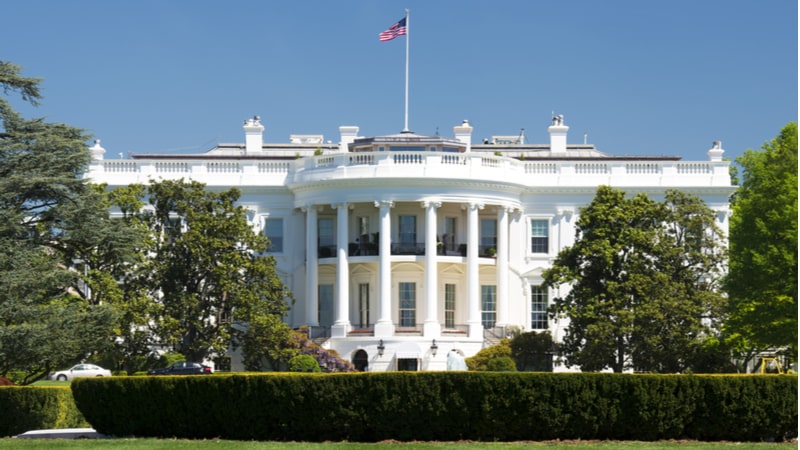
President Biden announced new actions today to strengthen U.S. supply chains, including several technology-focused initiatives such as the creation of the White House Council on Supply Chain Resilience.
The council is having its inaugural meeting today, which the White House said will advance the president’s “long-term, government-wide strategy to build enduring supply chain resilience.”
The Biden administration also announced the launch of the quadrennial supply chain review, which the council will complete by Dec. 31, 2024. As part of the review, the council will update key criteria on critical industries, sectors, and products.
The creation of the council is one of nearly 30 actions the White House announced today to further strengthen supply chains.
Other Tech Actions Across Government
Among those actions, the White House said, are new cross-governmental supply chain data-sharing capabilities.
For example, the Department of Commerce’s (DoC) new Supply Chain Center is “integrating industry expertise and data analytics to develop innovative supply chain risk assessment tools, and is coordinating deep-dive analyses on select critical supply chains to drive targeted actions to increase resilience,” the White House said.
Another data-sharing partnership is the Department of Transportation’s (DoT) Freight Logistics Optimization Works (FLOW) program, which brings together both public and private U.S. supply chain stakeholders to create a shared picture of supply chain networks.
The White House also said that the Department of Energy (DoE) today announced $275 million in grant selections for its Advanced Energy Manufacturing and Recycling Grant Program, which looks to revitalize communities affected by coal mine or power plant closures though investment in clean energy supply chains.
“President Biden’s Investing in America agenda is driving the manufacturing boom while preserving the communities and workforce that have powered our nation for generations,” said U.S. Secretary of Energy Jennifer Granholm. “With these historic investments, DoE will bring new economic opportunities and ensure these communities continue their key role in strengthening America’s national and energy security.”
DoE’s Office of Energy Efficiency and Renewable Energy (EERE) Advanced Materials and Manufacturing Technologies Office (AMMTO) is also sponsoring a study by the National Academies of Science, Engineering, and Medicine to develop a national plan for smart manufacturing. This report “will establish key priorities for investment to support new digital and artificial intelligence technologies,” the White House said.
DoE will also be busy developing a tool to assess energy and critical mineral supply chain readiness.
The United States is heavily reliant on imports when it comes to critical minerals – such as rare earth elements, lithium, and cobalt – which can be found in computers, household appliances, and smartphones. Therefore, DoE and the Department of the Interior’s U.S. Geological Survey (USGS) will map and develop “geospatial databases for select global critical product supply chains, with a current focus on semiconductor components.”
As part of this effort, the National Science and Technology Council’s Critical Minerals Subcommittee plans to launch a new criticalminerals.gov website in January 2024 to highlight cross-governmental supply chain efforts.
Additionally, the Department of Defense (DoD) plans to publish the first-ever National Defense Industrial Strategy (NDIS), building on the $714 million in Defense Production Act (DPA) investments it has already made this year to support defense-critical supply chains.
The DoD is also looking to increase supply chain visibility through the creation of a Supply Chain Mapping Tool to analyze supplier data for 110 weapon systems.
Another tech initiative, led by the DoC, is the Supply Chain Data and Analytics Summit in 2024 for both public and private stakeholders. The summit will focus on supply chain risk assessment models and tools.
Additionally, the USGS, the Defense Advanced Research Projects Agency (DARPA), and the Advanced Research Projects Agency-Energy (ARPA-E) will host a series of AI hackathons beginning in February 2024 to strengthen critical mineral supply chains.
Finally, the Department of Homeland Security (DHS) announced the launch of the new Supply Chain Resilience Center (SCRC) and tabletop exercises to test cross-border supply chains.
“Securing our critical infrastructure is fundamental to staying competitive in a 21st century economy, and the Department of Homeland Security’s new Supply Chain Resilience Center will enhance our efforts to do just that,” said DHS Secretary Alejandro Mayorkas. “The global pandemic has revealed that the supply chains that Americans rely upon for food and essential other goods must be more robust and resilient.”
“Conflict, political instability, and climate change could challenge our supply chains in the years ahead. The Supply Chain Resilience Center will help American businesses and the federal government anticipate these disruptions and play a key role in the Biden-Harris Administration’s work to prevent them,” Mayorkas added.
